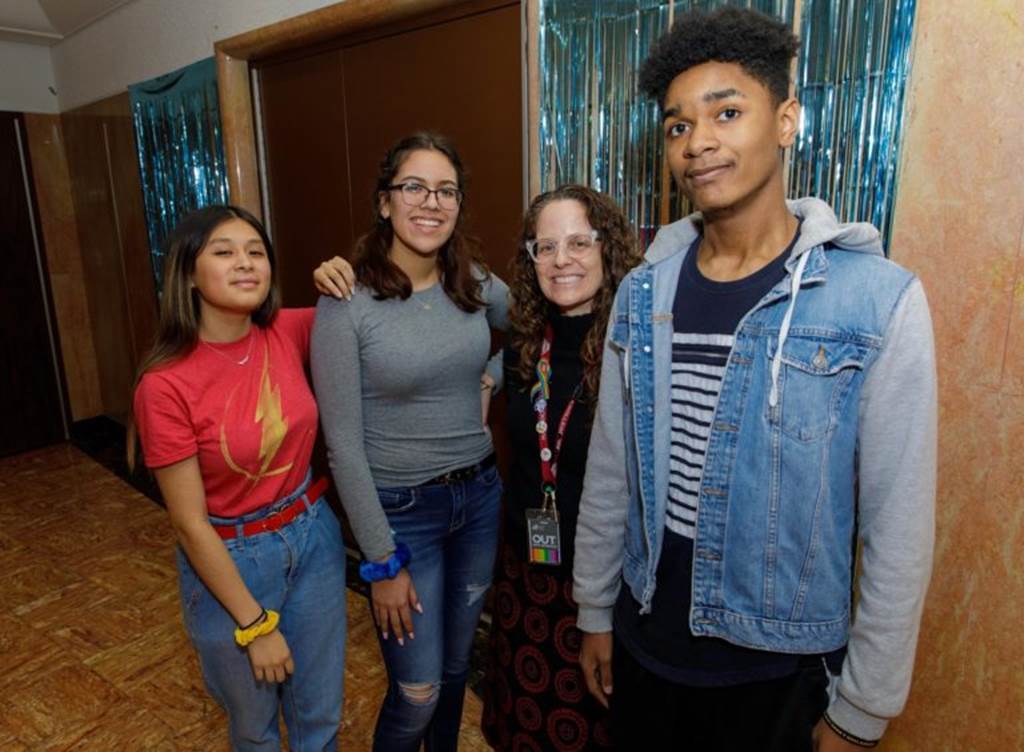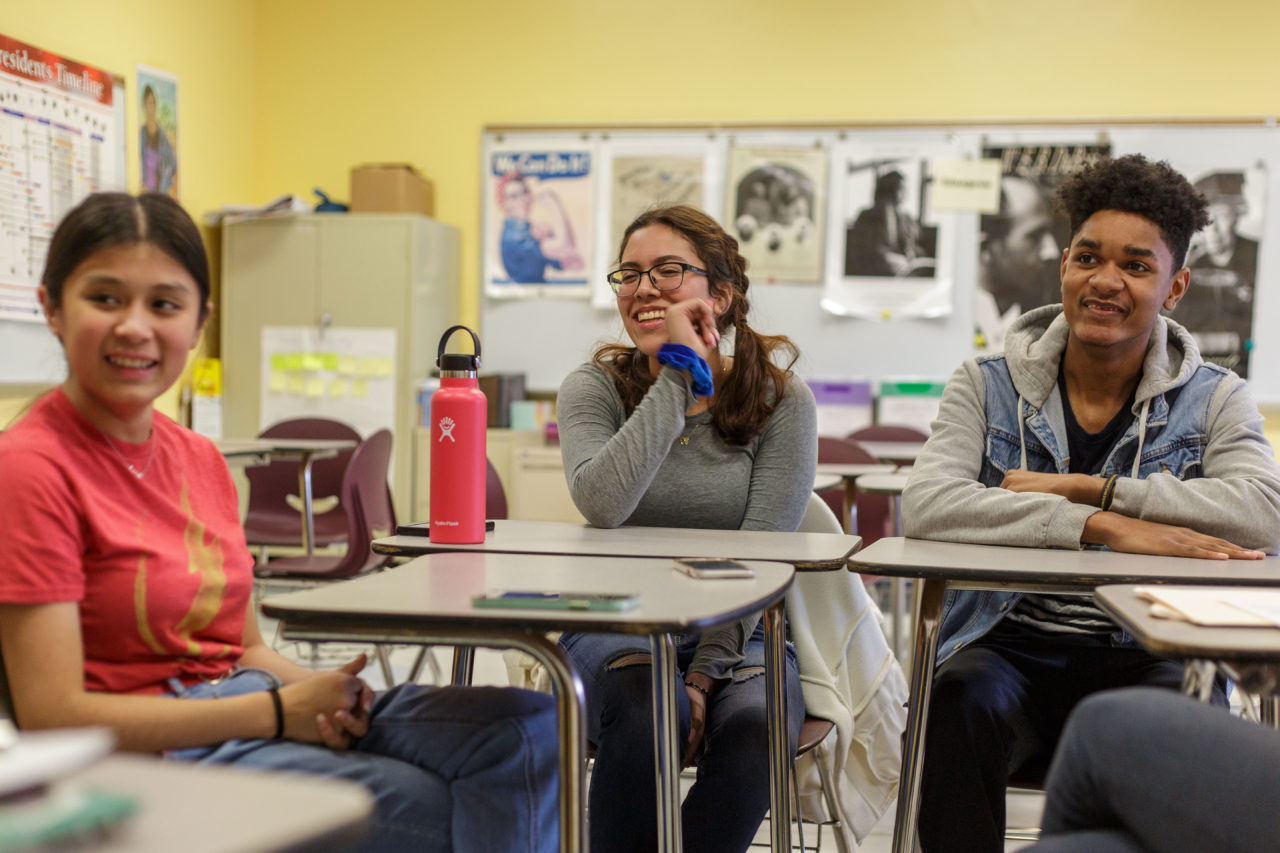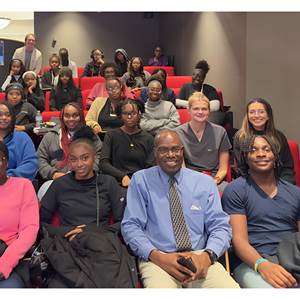Poetic Justice | Justicia Poética
25 February 2020
John Hancock College Preparatory High School junior Maria M. says her decision to join her school’s slam poetry team as a freshman stems from when one of her elementary school teachers showed her class a documentary on Louder than a Bomb, the annual youth poetry slam in Chicago.

How Students at Hancock High School Explore Social Issues through Slam Poetry
John Hancock College Preparatory High School junior Maria M. says her decision to join her school’s slam poetry team as a freshman stems from when one of her elementary school teachers showed her class a documentary on Louder than a Bomb, the annual youth poetry slam in Chicago. Now, after competing in Louder than a Bomb herself for the past few years, poetry has become an irreplaceable part of who she is.
“Even after I graduate, I want to keep poetry in my future because it is such a big part of me,” she said. “I think it might be one of the biggest parts of me—my slam team and just poetry itself are such constant factors in my life.”
Maria wasn’t the only new face on the slam poetry team two years ago. She’s built a strong bond with fellow juniors Eveny T. and Cortez S. as teammates and as friends. Although the beginning of every season focuses on brainstorming ideas and getting to know new members, the team grows closest from the collective effort it takes to write, revise, and re-write their individual pieces. Eveny says the number one thing she’s learned from slam poetry is that your poem is never really finished.
“Slam poetry is all about prioritization. If someone gives me feedback, I know that I should make edits as soon as I can instead of procrastinating,” Eveny said. “At the same time, it’s important to remember why I am on the team. Writing poetry allows me to be creative and is a way for me to express myself.”

The slam team’s name—Poetic Justice—reflects their goal of using poetry to draw attention to important topics that the team cares about. For example, they recently completed a piece for the new year inspired by YouTube’s 2019 Rewind video. Instead of talking about viral trends, the team went month by month outlining the important political, social, and global events of the past year—touching on everything from climate change and corruption to nuclear weapons.
On the flip side, Maria says that poems about personal topics, such as having complex and often difficult relationships with one’s family, can unite the team just as much as political and social justice topics. She says that the combination of learning about issues impacting the world and writing about what is specifically impacting her own life makes each team meeting valuable.
“I almost think of slam poetry as a sport,” Maria said. “Playing around with words is very fun, and it definitely builds up your knowledge of current events. And it’s also very challenging at times to translate how you are feeling onto a piece of paper.”
The team follows the same routine at each competition. To help ease their nerves, they get into a big circle and say a prayer about their hopes for when they get on stage. Cristen Chapman, a social studies teacher at Hancock and the team’s coach, says that the experience of watching other teams perform is as valuable for her students as performing themselves.
“From watching other schools perform, I have learned that there are a lot of things going on outside of your community that you might not even know about,” said Eveny. “You cannot be close-minded when listening to other performers because you do not have the same struggles as the person to the left of you.”
And while the thrill of competing is a big plus, the three students agree that meeting and learning to work with different types of people is the most important skill they will take away from being on the slam poetry team. Keep an eye out for them—you might just see them at Chicago’s next open mic.

Cómo los estudiantes de la Escuela Secundaria Hancock analizan los temas sociales a través de la poesía slam
Maria M., estudiante de la escuela John Hancock, decidió unirse al equipo de poesía cuando cursaba 9.° grado tras haberse inspirado por un documental que uno de sus maestros de primaria le mostró a la clase. Se trataba de Louder than a Bomb, un concurso anual de poesía juvenil en Chicago. Ahora, ella ya ha competido en Louder than a Bomb durante los últimos años, y la poesía se ha convertido en una parte irremplazable de su identidad.
“Aún después de graduarme, quiero seguir mi pasión por la poesía en el futuro porque es una gran parte de mí”, dijo. “Creo que puede ser una de las mayores partes de mi vida; mi equipo y la poesía son factores permanentes en mi vida”.
María no era la única nueva en el equipo de poesía slam hace dos años. Ha establecido un fuerte vínculo con Eveny T. y Cortez S., quienes no sólo son sus compañeros de clases y de equipo, sino también sus amigos. Aunque el comienzo de cada temporada se centra en el intercambio de ideas y en conocer a los nuevos miembros, el equipo se intimó debido al esfuerzo colectivo que se necesita para escribir, revisar y reescribir sus poemas individuales. Eveny dice que lo más importante que ha aprendido de la poesía slam es que no existe tal cosa como un poema terminado.
“La poesía slam consiste en priorizar. Si alguien me da un comentario, sé que debería revisar mi poema tan pronto como pueda en lugar de posponerlo”, dijo. “Al mismo tiempo, es importante recordar por qué estoy en el equipo. Escribir poesía me permite ser creativa y es una forma de expresarme”.
Para María, Eveny y Cortez la crítica constructiva se ha convertido en una parte esencial del proceso creativo. Sin embargo, admiten que al principio fue un reto encontrar la confianza en sí mismos para revisar los poemas de sus compañeros. Ahora que han mejorado sus habilidades de composición, saben que un sólido equipo de slam está formado por miembros que no temen compartir sus poemas con los demás, y que trabajan juntos para que sus poemas tengan el mayor impacto posible.
“En las primeras veces, a lo mejor sentirás que no quieres ofender a nadie o criticar duramente los poemas”, dijo Cortez. “Pero eso es parte del proceso: tienes que ser capaz de expresar tu opinión sobre el poema para ayudar que tu compañero se convierta en un mejor artista”.
El nombre del equipo de slam—Justicia Poética—refleja su objetivo de usar la poesía para llamar la atención sobre temas importantes que le importa al equipo. Por ejemplo, recientemente terminaron un poema para el año nuevo que fue inspirado por el video Rewind 2019 de YouTube. En lugar de hablar de las tendencias virales, mes tras mes, el equipo resumieron los importantes acontecimientos políticos, sociales y globales del año pasado, tales como el cambio climático, la corrupción y las armas nucleares.
Por otro lado, María dice que los poemas sobre temas personales, como tener relaciones complejas con la familia, pueden unir al equipo de la misma manera como los temas políticos y de justicia social. Dice que al aprender sobre temas globales y al escribir sobre lo que le afecta específicamente a su vida hace que cada reunión del equipo sea valiosa.
“Considero la poesía slam como un deporte”, dijo. “Jugar con las palabras es muy divertido, y definitivamente aumenta tu conocimiento de los acontecimientos actuales. Y a veces también es muy difícil expresar tus sentimientos en un pedazo de papel”.
El equipo sigue la misma rutina en cada competencia. Para ayudar a calmar sus nervios, hacen un gran círculo y dicen una oración sobre sus expectativas cuando suben al escenario. Cristen Chapman, maestra de estudios sociales en la escuela y asesora del equipo, dice que la experiencia de ver a otros equipos recitar es tan valiosa como la recitación de los mismos estudiantes.
“Al ver a estudiantes de otras escuelas recitar, he aprendido que fuera de tu comunidad ocurren muchas cosas que ni siquiera conoces, dijo Eveny. “No puedes tener la mente cerrada cuando escuchas a otros artistas recitar porque no tienes las mismas dificultades que la persona a tu izquierda”.
Y aunque la emoción de competir es una gran ventaja, los tres estudiantes están de acuerdo en que trabajar con diferentes tipos de personas es la habilidad más importante que ha aprendido del equipo de poesía slam. Mantente pendiente de ellos, tal vez los veas en el próximo evento de micrófono abierto en Chicago.
Related Stories
05 December 2024
How One High School Student Is Laying the Foundation for a Successful Future
Meadow has taken advantage of early college opportunities.
14 November 2024
Connecting Classroom Instruction to Potential Future Careers
The Illinois College of Optometry has been an amazing partner for CPS.
02 October 2024
Celebrating Mexican Independence Day at Telpochcalli Elementary School
This event highlights the hard work of the entire Telpochalli community in fostering cultural pride and student achievement.
06 June 2024
Getting to Know Three Outstanding Peterson Elementary Class of 2024 Graduates
Ellie, William, and Jocelyn are known as resilient student leaders in their school community.




